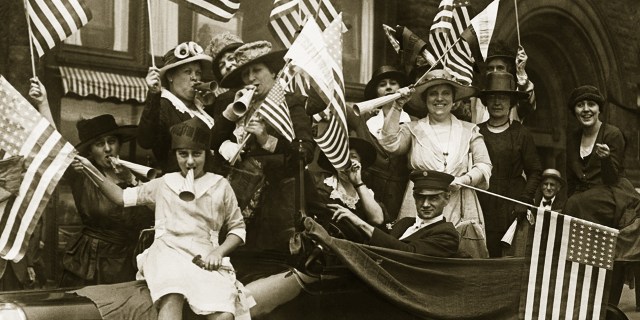
Pew Research Center conducted this study to understand Americans’ views of the current state of gender equality and the advancement of women around the 100th anniversary of women getting the right to vote. For this analysis, we surveyed 3,143 U.S. adults in March and April 2020, including an oversample of Black and Hispanic respondents. The adults surveyed are members of the Ipsos Public Affairs KnowledgePanel, an online survey panel that is recruited through national random sampling of residential addresses and landline and cellphone numbers. KnowledgePanel provides internet access for those who do not have it and, if needed, a device to access the internet when they join the panel. To ensure that the results of this survey reflect a balanced cross section of the nation, the data are weighted to match the U.S. adult population by gender, age, education, race and ethnicity and other categories. The survey was conducted in English and Spanish.
Here are the questions used for this report, along with responses, and the report’s methodology.
References to white and Black adults include only those who are non-Hispanic and identify as only one race. Hispanics are of any race.
All references to party affiliation include those who lean toward that party. Republicans include those who identify as Republicans and independents who say they lean toward the Republican Party. Democrats include those who identify as Democrats and independents who say they lean toward the Democratic Party.
References to college graduates or people with a college degree comprise those with a bachelor’s degree or more. “Some college” includes those with an associate degree and those who attended college but did not obtain a degree.
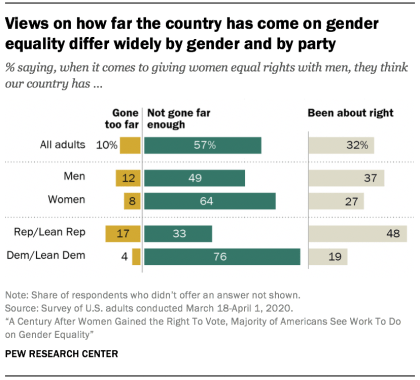
A hundred years after the 19th Amendment was ratified, about half of Americans say granting women the right to vote has been the most important milestone in advancing the position of women in the country. Still, a majority of U.S. adults say the country hasn’t gone far enough when it comes to giving women equal rights with men, even as a large share thinks there has been progress in the last decade, according to a new Pew Research Center survey.
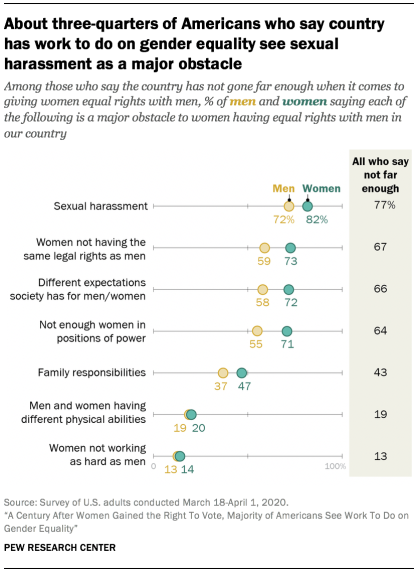
Among those who think the country still has work to do in achieving gender equality, 77% point to sexual harassment as a major obstacle to women having equal rights with men. Fewer, but still majorities, point to women not having the same legal rights as men (67%), different societal expectations for men and women (66%) and not enough women in positions of power (64%) as major obstacles to gender equality. Women are more likely than men to see each of these as a major obstacle.
Many of those who say it is important for men and women to have equal rights point to aspects of the workplace when asked about what gender equality would look like. Fully 45% volunteer that a society where women have equal rights with men would include equal pay. An additional 19% say there would be no discrimination in hiring, promotion or educational opportunities. About one-in-ten say women would be more equally represented in business or political leadership.
In terms of the groups and institutions that have done the most to advance the rights of women in the U.S., 70% say the feminist movement has done at least a fair amount in this regard. The Democratic Party is viewed as having contributed more to the cause of women’s rights than the Republican Party: 59% say the Democratic Party has done at least a fair amount to advance women’s rights, while 37% say the same about the GOP. About three-in-ten (29%) say President Donald Trump has done at least a fair amount to advance women’s rights, while 69% say Trump has not done much or has done nothing at all. These views vary considerably by party, with Republicans and Republican leaners at least five times as likely as Democrats and those who lean Democratic to say the GOP and Trump have done at least a fair amount and Democrats far more likely than Republicans to say the same about the Democratic Party.
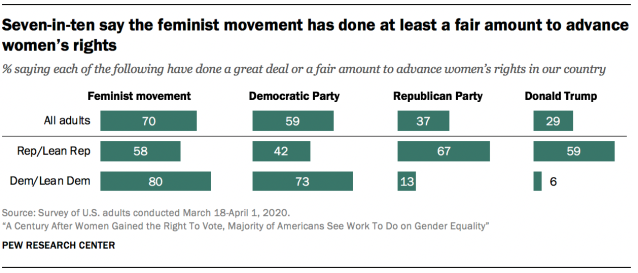
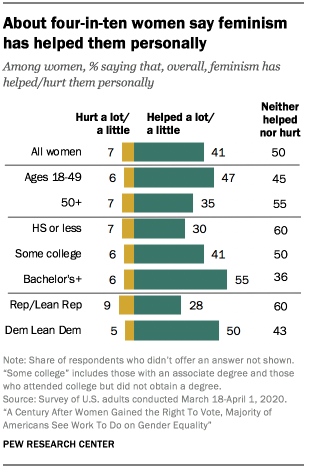
Views of the role the feminist movement has played in advancing gender equality are positive overall, though fewer than half of women say the movement has been beneficial to them personally. About four-in-ten (41%) say feminism has helped them at least a little, while half say it has neither helped nor hurt them. Relatively few (7%) say feminism has hurt them personally. Democratic women, those with a bachelor’s degree or more education and women younger than 50 are among the most likely to say they’ve benefitted personally from feminism.
Views about how much progress the country has made on gender equality differ widely along partisan lines. About three-quarters of Democrats (76%) say the country hasn’t gone far enough when it comes to giving women equal rights with men, while 19% say it’s been about right and 4% say the country has gone too far. Among Republicans, a third say the country hasn’t made enough progress, while 48% say it’s been about right and 17% say the country has gone too far in giving women equal rights with men.
There is also a gender gap in these views, with 64% of women – compared with 49% of men – saying the country hasn’t gone far enough in giving women equal rights with men. Democratic and Republican women are about ten percentage points more likely than their male counterparts to say this (82% of Democratic women vs. 70% of Democratic men and 38% of Republican women vs. 28% of Republican men).
The nationally representative survey of 3,143 U.S. adults was conducted online from March 18-April 1, 2020.1 Among the other key findings:
More cite women’s suffrage than other milestones as the most important in advancing the position of women in the U.S. About half of Americans (49%) say women gaining the right to vote has been the most important milestone in advancing the position of women in the U.S.; 29% cite the passage of the Equal Pay Act, while smaller shares point to the passage of the Family and Medical Leave Act (12%) or the availability of the birth control pill (8%) as the most important milestone.
A majority of Americans say feminism has had a positive impact on the lives of white, Black and Hispanic women. About six-in-ten or more U.S. adults say feminism has helped the lives of white (64%), Black (61%) and Hispanic (58%) women at least a little. But more say feminism helped white women a lot (32%) than say it’s done the same for Black (21%) or Hispanic (15%) women. About a quarter (24%) say feminism has helped wealthy women a lot; just 10% say it’s been equally helpful to poor women.
About four-in-ten Republican men think women’s gains have come at the expense of men. Most Americans (76%) say the gains women have made in society have not come at the expense of men, but 22% think these gains have come at the expense of men. That view is more common among men (28%) than women (17%). Republican and Democratic men are more likely than their female counterparts to say the gains women have made in society have come at the expense of men. About four-in-ten Republican men (38%) say women’s gains have come at the expense of men, compared with 25% of Republican women, 19% of Democratic men and 12% of Democratic women.
Democrats are more likely than Republicans to say that, when it comes to gender discrimination, the bigger problem is discrimination being overlooked. Two-thirds of U.S. adults say the bigger problem for our country today is people not seeing gender discrimination where it really does exist; 31% say people seeing gender discrimination where it really does not exist is the bigger problem. More than eight-in-ten Democrats (85%) point to people overlooking gender discrimination as the bigger problem; 46% of Republicans say the same.
Most Americans favor adding the ERA to the U.S. Constitution, even as many don’t think this would make much difference for women’s rights. About eight-in-ten U.S. adults (78%), including majorities of men and women and Republicans and Democrats alike, say they at least somewhat favor adding the Equal Rights Amendment (ERA) to the U.S. Constitution. When asked about the impact they think adopting the ERA would have on women’s rights in the U.S., 44% say it would advance women’s rights, while 5% say this would be a setback for women’s rights and 49% say it would not make much of a difference. Even among those who favor adopting the amendment, 44% say doing so wouldn’t have much of an impact on women’s rights (54% say it would advance women’s rights).
A majority of Americans say the country has not gone far enough in giving women equal rights with men
The vast majority of Americans across demographic and partisan groups agree that women should have equal rights with men. More than nine-in-ten U.S. adults say it is very important (79%) or somewhat important (18%) for women to have equal rights with men in this country. Just 3% of Americans say gender equality is not too or not at all important.
Democrats and those who lean to the Democratic Party (86%) are more likely than Republicans and Republican leaners (71%) to say it is very important for women to have equal rights with men. Still, majorities of Republicans and Democrats, including at least two-thirds of men and women in each party, say this is very important.
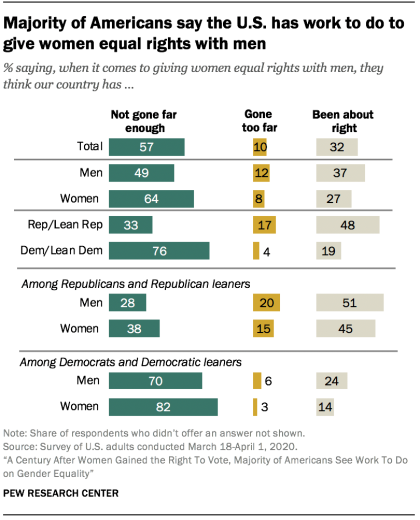
When it comes to giving women equal rights with men, a majority of adults (57%) think our country has not gone far enough, while 32% say things have been about right; 10% of Americans say the country has gone too far in giving women equal rights with men.
Women (64%) are more likely than men (49%) to say the country hasn’t made enough progress on gender equality. However, there is also a sizable party gap. Roughly three-quarters of Democrats (76%) say the country hasn’t gone far enough when it comes to giving women equal rights with men, compared with 33% of Republicans. Instead, 48% of Republicans – compared with 19% of Democrats – say things are about right when it comes to gender equality and 17% say the country has gone too far; just 4% of Democrats say things have gone too far.
Across parties, women are more likely than men to say the U.S. has not gone far enough in giving women equal rights with men. About four-in-ten Republican women (38%) say that gender equality has not come far enough, compared with 28% of Republican men. Still, about half of Republican men (51%) and 45% of Republican women say things are about right in the country when it comes to gender equality.
Among Democrats, 82% of women, compared with 70% of men, say the country still has work to do on gender equality. About a quarter of Democratic men (24%) say things are about right in the country when it comes to giving women equal rights with men, compared with 14% of Democratic women who say the same.
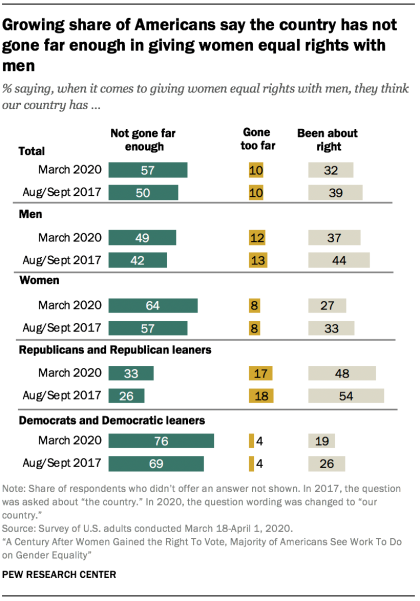
Among Democrats, those with at least some college education are more likely than those with no college experience to express dissatisfaction with the current state of gender equality. About eight-in-ten Democrats with a bachelor’s degree or more education (82%) and 77% of those with some college education say the country hasn’t gone far enough when it comes to giving women equal rights with men, compared with 71% of Democrats with a high school diploma or less education. Among Republicans, there is generally more agreement across levels of educational attainment.
Overall, Americans express more dissatisfaction with the state of gender equality now than they did in 2017, when this question was last asked. Then, half said the country hadn’t gone far enough in giving women equal rights with men, while 39% said things were about right and 10% said the country had gone too far. Attitudes have shifted among men and women and Republicans and Democrats alike.
Most Democrats and Republicans say the country has made progress in giving women and men equal rights over the last 10 years
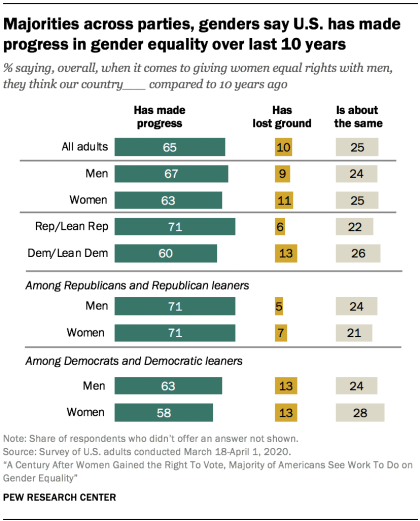
While many Americans say there’s still work to be done to achieve gender equality, most say there’s been progress over the past decade. Majorities of men and women say the U.S. has made progress in the last 10 years when it comes to giving women equal rights with men. Still, 25% of Americans say things are the same as they were 10 years ago, and one-in-ten say the country has lost ground when it comes to equal rights for women.
Majorities of Democrats (60%) and Republicans (71%) say that, in the last 10 years, the country has made progress on gender equality. However, Democratic women are the least likely to say this: 58% of Democratic women say this, compared with 63% of Democratic men and 71% of both Republican men and Republican women. Instead, 28% of Democratic women say things are about the same as they were 10 years ago (21% of Republican women say the same).
About three-in-ten U.S. men think women’s gains have come at the expense of men
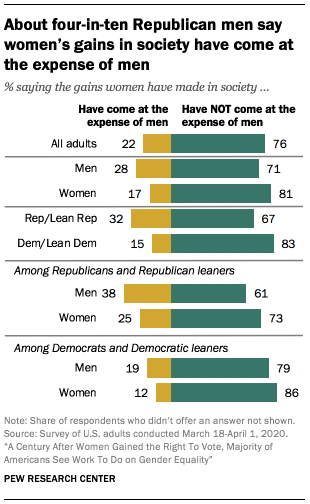
When it comes to the gains that women have made in society, most Americans (76%) say the gains have not come at the expense of men, but 22% – including 28% of men – think these gains have come at the expense of men.
Republican men (38%) are twice as likely as Democratic men (19%) to say the gains women have made have come at the expense of men. A quarter of Republican women also say this, less than the share of their male counterparts but higher than the shares of Democratic men and women (12%) that hold this view.
Among women, those without a bachelor’s degree are about twice as likely as college graduates to say gains have come at the expense of men (21% vs. 10%); educational differences are less pronounced, though still significant, among men: 30% of men with some college or less education say the gains women have made in society have come at the expense of men, compared with 24% of men with at least a bachelor’s degree.
Most who say the country still has work to do on gender equality say equality is likely in the future
On the whole, the majority of Americans who say that the country has not gone far enough to give women equal rights with men think it is very or somewhat likely that women in our country will eventually have equal rights with men. More than eight-in-ten Americans who say the country hasn’t made enough progress say this is very likely (31%) or somewhat likely (53%); just 16% say they think it is not too likely or not at all likely.
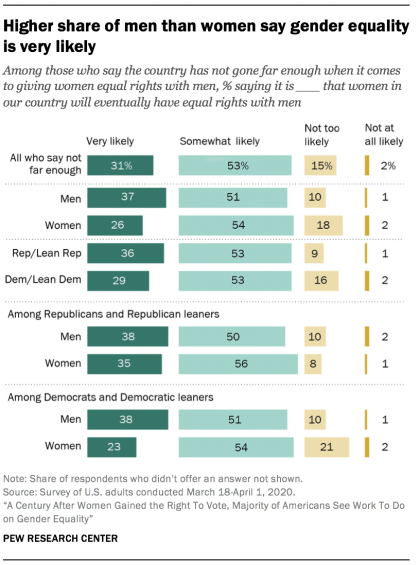
Large majorities of men and women and Republicans and Democrats who say the country has not yet achieved gender equality say it is at least somewhat likely that men and women will eventually have equal rights, but men (37%) are considerably more likely than women (26%) to say it is very likely.
Among Republicans who say the U.S. has work to do to achieve gender equality, 36% say gender equality is very likely, compared with 29% of Democrats. This difference is driven in part by Democratic women, who are among the least likely to say they expect men and women to eventually have equal rights. Among Democratic women who say the country hasn’t gone far enough to achieve gender equality, 23% say they think it is very likely that there will eventually be gender equality; 38% of Democratic men say the same.
Even among the small share of Americans who say the country has lost ground on gender equality in the last 10 years, 76% say it is very or somewhat likely that women will eventually have equal rights with men.
More cite equality in the workplace than any other example as a sign of a society where men and women are equal
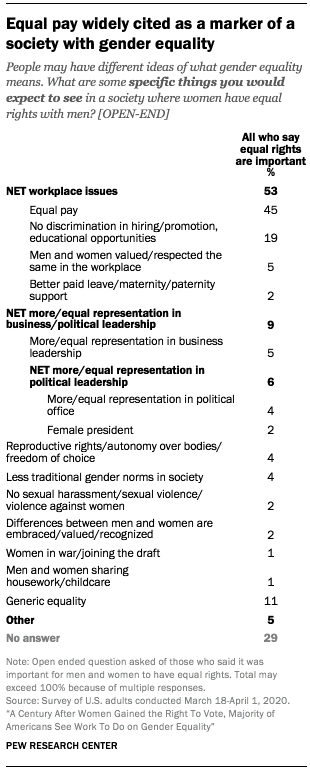
When those who say it is important for women to have equal rights with men are asked what a society with gender equality might look like, about half give examples that focus on equality in the workplace: 45% specifically say equal pay, 19% cite no discrimination in hiring and promotion, 5% say men and women getting equal respect in the workplace, and 2% say better paid leave and paternity and maternity support are things they would expect to see in a society where women have equal rights with men.
About one-in-ten cite more or equal representation of women in leadership, with 6% specifically mentioning political leadership and 5% mentioning business leadership. Relatively few point to reproductive rights (4%) and less traditional gender norms (4%) as markers of a society where women have equal rights with men. (Respondents were asked to answer this question in their own words; for respondents who gave multiple examples, up to three responses were coded.)
For the most part, men and women who say equal rights are important have a similar picture of what a society with gender equality would look like, but a larger share of women than men cite equal pay (51% vs. 40%). Still, the gender pay gap tops the list for both men and women who say gender equality is important.
Among women, references to equal pay differ by age. Women ages 50 and older (56%) are more likely than women under 50 (45%) to mention equal pay when describing a society where men and women have equal rights.
Democrats who say gender equality is important are more likely than their Republican counterparts to cite equal pay when asked about a society with gender equality: 50% of Democrats say this, compared with 41% of Republicans. Democrats are also more likely than Republicans to say that more or equal representation in business and politics is a marker of equality (12% vs. 5%).
Wide party and gender gaps in views of the obstacles women face in achieving gender equality
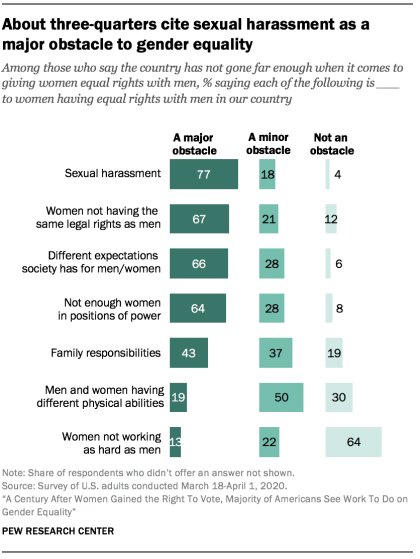
When Americans who say the country has not gone far enough in giving women equal rights with men are asked about the obstacles to achieving equal rights, sexual harassment tops the list: 77% say this is a major obstacle for women. Roughly two-thirds say women not having the same legal rights as men (67%) and the different expectations that society has for men and women (66%) are major obstacles, and 64% say the same about not enough women in positions of power. Some 43% point to family responsibilities as a major obstacle, while fewer cite men and women having different physical abilities (19%) and women not working as hard as men (13%) as major obstacles. Roughly two-thirds (64%) of those who say the country has work to do on gender equality say women not working as hard as men is not an obstacle to gender equality.
Perceptions of the obstacles to gender equality vary across genders. For example, while 71% of women who say the country hasn’t gone far enough in giving women equal rights with men cite not enough women in positions of power as a major obstacle to gender equality, 55% of men say the same.
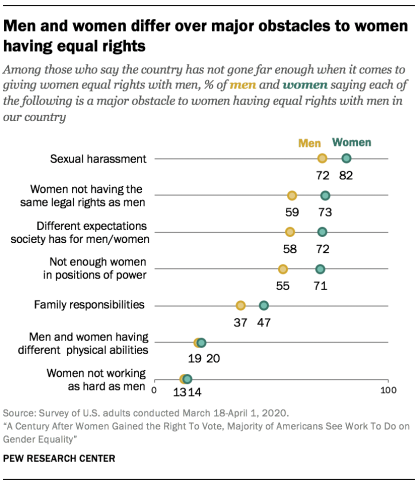
A majority of women who say the country hasn’t made enough progress on gender equality also point to women not having the same legal rights as men (73%) and different societal expectations for men and women (72%) as major obstacles to women having equal rights with men. Fewer men who say this see each of these as major obstacles to gender equality (59% and 58%, respectively).
When it comes to the role sexual harassment plays in men and women having equal rights, women who say the country hasn’t gone far enough when it comes to gender equality (82%) are more likely than men who say the same (72%) to cite this as a major obstacle, though large majorities of both groups say this.
Among women who say the country hasn’t made enough progress on gender equality, those with at least a bachelor’s degree are more likely than those who have attended some college or less to say different societal expectations (81% vs. 67%) and not enough women in positions of power (80% vs. 66%) are major obstacles.
Among those who say there’s work to be done on gender equality, a majority of Democrats, but fewer than half of Republicans, see not enough women in power as a major obstacle
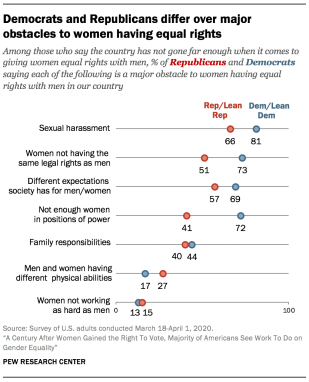
Among those who say there’s more work to be done in giving women equal rights with men, Democrats and Republicans differ on the extent to which certain factors are holding women back. A higher share of Democrats than Republicans point to not enough women in positions of power (72% vs. 41%), women not having the same legal rights as men (73% vs. 51%), sexual harassment (81 % vs. 66%) and different societal expectations (69% vs. 57%) as major obstacles to women having equal rights with men.
Republicans who say the country has not gone far enough to give women equal rights (27%) are more likely than similarly minded Democrats (17%) to say differences in the physical abilities of men and women are a major obstacle to women having equal rights with men, although relatively small shares of each group say this is the case. Meanwhile, there are no significant partisan gaps when it comes to views of family responsibilities (44% of Democrats and 40% of Republicans see it as a major obstacle) or women not working as hard as men (13% and 15%, respectively).
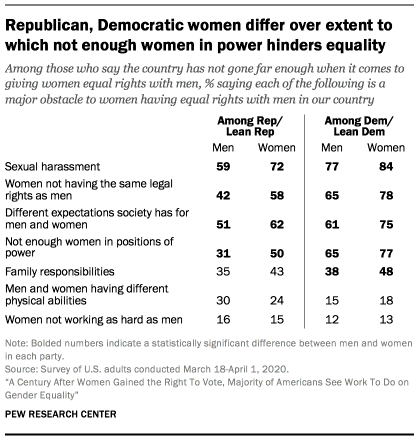
Democratic women are particularly likely to see some of these as major obstacles, while Republican men tend to be the least likely to do so. For example, 78% of Democratic women say women not having the same legal rights as men is a major obstacle to equal rights, as do 65% of Democratic men and 58% of Republican women. In contrast, 42% of Republican men say this is a major obstacle.
And while 77% of Democratic women, 65% of Democratic men and 50% of Republican women say not enough women in positions of power is a major obstacle to gender equality, just 31% of Republican men say the same.
Democrats are nearly twice as likely as Republicans to say there are problems with gender discrimination being overlooked
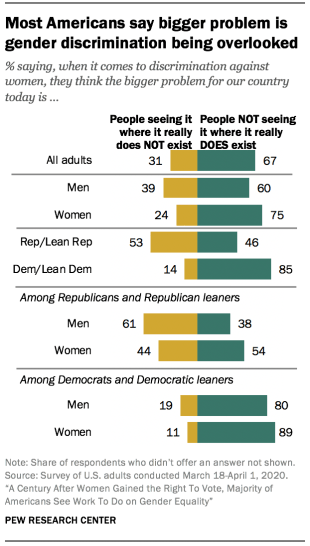
When it comes to gender discrimination, by more than a two-to-one margin Americans say the bigger problem for the country is people not seeing discrimination where it really does exist, rather than people seeing gender discrimination where it really does not exist (67% vs. 31%).
The vast majority of Democrats (85%) say the bigger problem is people not seeing gender discrimination where it really exists. In contrast, more Republicans say the bigger problem is people seeing discrimination where it doesn’t exist (53%) than say the people overlooking discrimination is the bigger problem (46%).
There is a wide gender gap among Republicans. While a majority of Republican men (61%) say the bigger problem is people seeing gender discrimination where it doesn’t exist, fewer than half of Republican women (44%) say the same. Democratic men are also more likely than their female counterparts to say this (19% vs. 11%), but 80% of Democratic men and 89% of Democratic women agree that the bigger problem is people overlooking gender discrimination.
More cite women gaining the right to vote than other milestones as the most important in advancing the position of women
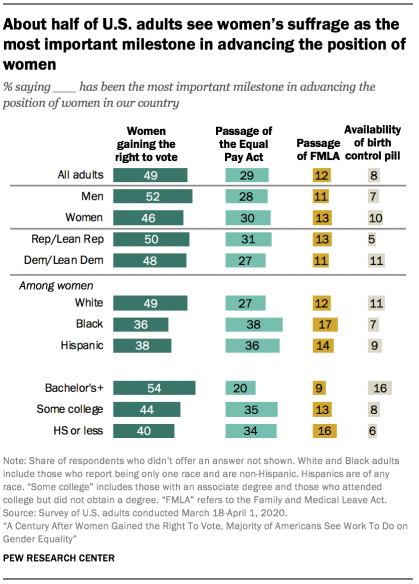
When asked about milestones they see as important in advancing the position of women in the U.S., about half of Americans (49%) point to women gaining the right to vote as the most important milestone, a view that is more common among men (52%) than women (46%). Roughly three-in-ten U.S. adults (29%) cite the passage of the Equal Pay Act, while smaller shares say passage of the Family and Medical Leave Act (FMLA) and the availability of the birth control pill are the most important milestones in advancing the position of women (12% and 8%, respectively).
White adults, as well as those with at least a bachelor’s degree, are more likely than Black and Hispanic adults and those with less education to see women’s suffrage as the most important milestone in advancing the position of women in the U.S. Some 53% of white adults say women getting the right to vote has been a more important milestone than the passage of the Equal Pay Act, passage of the FMLA or the availability of the birth control pill. Black and Hispanic adults are about as likely to cite the passage of the Equal Pay Act as they are to cite women gaining the right to vote.
Among those with at least a bachelor’s degree, 59% see women’s suffrage as the most important milestone, compared with 48% of those with some college education and 41% of those with less education. Even so, across educational attainment, more point to women getting the right to vote than to the other milestones as the most important in advancing women’s rights in the U.S.
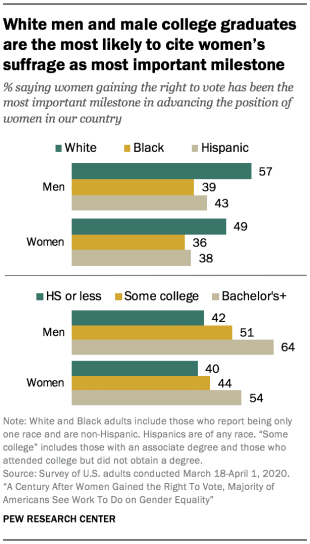
These differences by race and ethnicity and educational attainment are also evident when looking separately at the views of men and women. A majority of white men (57%) cite women gaining the right to vote as the most important milestone, compared with 39% of Black men and 43% of Hispanic men. And while white women are less likely than their male counterparts to say this (49% do so), even smaller shares of Black (36%) and Hispanic (38%) women point to women’s suffrage as the most important milestone.
Similarly, men with at least a bachelor’s degree (64%) are more likely than women with the same level of educational attainment (54%) to say women gaining the right to vote was the most important milestone. Both are more likely than their less educated counterparts to say this.
Views on this vary little, if at all, by age or partisanship, but Democrats and those who lean to the Democratic Party are about twice as likely as Republicans and Republican leaners to say the availability of the birth control pill has been the most important milestone in advancing the position of women in the U.S. (11% vs. 5%). Similar shares of Democratic women (12%) and men (11%) say this, compared with 6% of Republican women and an even smaller share of Republican men (3%).
A third of Americans know what year women in the U.S. gained the right to vote
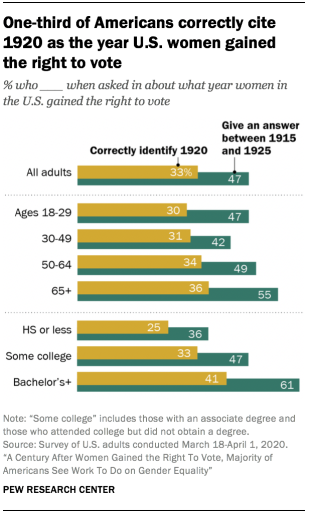
When asked in an open-ended format what year women in the U.S. gained the right to vote, 47% offer a year between 1915 and 1925 (within five years of the correct answer), including 33% who correctly identify 1920 as the year women gained the right to vote. About three-in-ten Americans (31%) say women gained the right to vote in 1926 or later, while just 7% say this happened before 1915. (Some 14% didn’t provide an answer.) Men and women give similar answers.
Those who say women gaining the right to vote has been the most important milestone in advancing women’s rights in the U.S. are not necessarily more knowledgeable about the timing of this milestone. An identical share of those who cite women’s suffrage or the availability of the birth control pill as the most important milestones correctly identify 1920 as the year women gained the right to vote (38% each). Similar shares in these groups offer a year between 1915 and 1925.
Educational attainment is related to knowledge of the year women in the U.S. gained the right to vote. About six-in-ten adults with at least a bachelor’s degree (61%) give a year between 1915 and 1925, with 41% correctly identifying 1920 as the year women gained the right to vote. Smaller shares of those with some college (47%) or with a high school diploma or less education (36%) give an answer within five years of the correct year, and a third and quarter, respectively, give the correct answer.
Adults ages 65 and older are more likely than those who are younger to give an answer within five years of the correct year. More than half of those ages 65 and older (55%) say U.S. women gained the right to vote between 1915 and 1925, compared with 49% of those ages 50 to 64, 42% of those ages 30 to 49 and 47% of adults younger than 30.
Majorities say the feminist movement and the Democratic Party have done at least a fair amount to advance women’s rights in the U.S.
Seven-in-ten Americans say the feminist movement has done a great deal (22%) or a fair amount (48%) to advance women’s rights in the U.S.; 59% say the same about the Democratic Party, including 12% who say it has done a great deal. In contrast, most Americans say the Republican Party (61%) and Donald Trump (69%) have not done much or have done nothing at all to advance women’s rights.
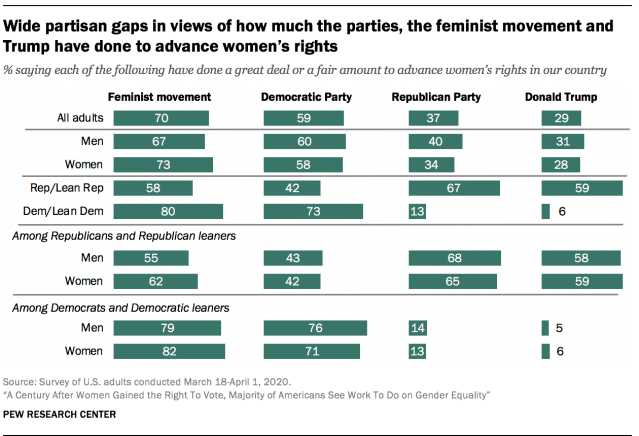
Women (73%) are more likely than men (67%) to say the feminist movement has done at least a fair amount to advance the rights of women in the U.S., but large majorities of each group say this. Meanwhile, a larger share of men (40%) than women (34%) say the GOP has done at least a fair amount in this area.
There are far wider partisan gaps than gender gaps when it comes to these views. About three-quarters of Democrats and those who lean Democratic (73%) say the Democratic Party has done at least a fair amount to advance women’s rights in the U.S.; fewer than half of Republicans and those who lean to the Republican Party (42%) say the same. Conversely, two-thirds of Republicans – but only 13% of Democrats – say the GOP has done a great deal or a fair amount in this area. Similarly, a majority of Republicans (59%) say Donald Trump has done at least a fair amount to advance women’s rights, while just 6% of Democrats say the same.
When it comes to the feminist movement’s impact, majorities of Democrats and Republicans say it has done at least a fair amount. Still, Democrats are far more likely than Republicans to say this (80% vs. 58%).
For the most part, views on this don’t vary considerably by gender within each party. Republican women (62%) are more likely than Republican men (55%) to say the feminist movement has done a great deal or a fair amount to advance women’s rights, but more than half of both say this. And while Democratic men are more likely than their female counterparts to say their party has done at least a fair amount, about seven-in-ten or more of each group share this view (76% of Democratic men and 71% of Democratic women). Republican men and women give similar views when it comes to how much each of the political parties and Donald Trump have done, and there are no significant differences between Democratic men and women in views of the feminist movement, the Republican Party or Trump.
Majorities say feminism has helped white, Black and Hispanic women
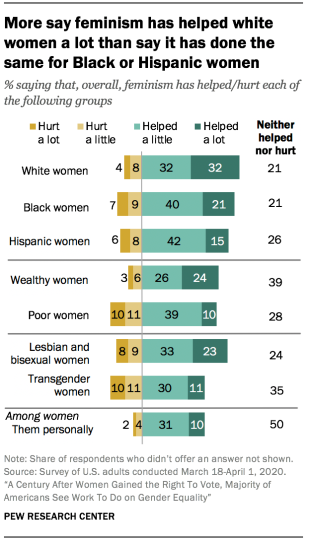
In addition to saying the feminist movement has done at least a fair amount to advance women’s rights in the U.S., a majority of Americans think feminism has had a positive impact on the lives of specific groups of women. For example, about six-in-ten or more say feminism has helped the lives of white (64%), Black (61%) and Hispanic (58%) women at least a little, although there are more pronounced differences in the shares saying feminism has helped each of these groups a lot (32% vs. 21% and 15%, respectively).2 Notably, just 41% of women say the movement has helped them personally.
A majority of Americans (57%) also think feminism has helped lesbian and bisexual women at least a little, including 23% who say it’s helped this group a lot. By comparison, 41% say feminism has helped transgender women, with just 11% saying this group has been helped a lot. About one-in-five (21%) say feminism has hurt transgender women, and 17% say the same about its impact on lesbian and bisexual women.
When asked about the impact of feminism on the lives of wealthy and poor women, 49% say it has helped each of these groups at least a little, but while 24% say feminism has helped wealthy women a lot, just one-in-ten say the same about the impact it’s had on the lives of poor women.
Opinions about how feminism has impacted each of these groups of women don’t differ significantly between men and women. In fact, the shares of men and women saying feminism has helped each of these groups at least a little vary only by 3 percentage points or less.
Majorities of white and Hispanic adults say feminism has helped white, Black and Hispanic women at least a little. Some 64% of Black adults also say feminism has helped white women, more than the shares who say it’s helped Black (49%) or Hispanic (48%) women. Black adults are the most likely to say feminism has helped white women a lot: 42% say this, compared with 34% of Hispanics and an even smaller share of white adults (29%).
Consistent with the difference in the shares of Republicans and Democrats who say the feminist movement has done at least a fair amount to advance women’s rights, Democrats are far more likely than Republicans to say feminism has helped each of these groups of women.
About four-in-ten women say feminism has helped them personally
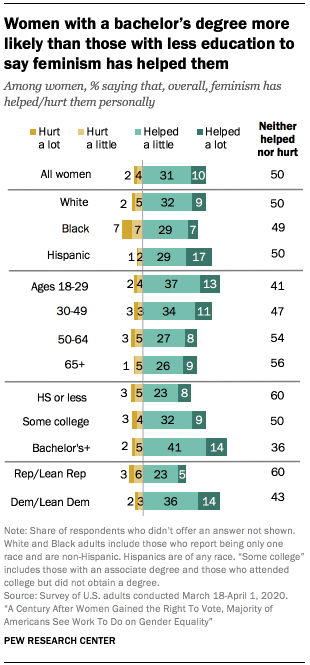
When asked about the impact of feminism on their own lives, 41% of women say it has helped them at least a little, with one-in-ten saying feminism has helped them a lot; 7% say feminism has hurt them, while half say it has neither helped nor hurt.3
Some 55% of women with at least a bachelor’s degree say feminism has helped them personally, compared with 41% of women with some college education and an even smaller share of those with a high school diploma or less education (30%). In turn, six-in-ten of those with no college experience and half of those with some college say feminism has neither helped nor hurt them; 36% of women with a bachelor’s degree or more education say the same.
Hispanic women (46%) are more likely than Black women (36%) to say feminism has helped them personally; white women fall somewhere in the middle (41% say feminism has helped them). There are also differences by age, with 47% of women younger than 50 saying feminism has helped at least a little, compared with 35% of those ages 50 and older.
Among Democratic women, half say feminism has helped them personally, while just 5% say it has hurt them and 43% say it has neither helped nor hurt. By comparison, 28% of Republican women say feminism has helped them, while a majority (60%) say it’s neither helped nor hurt; 9% of Republican women say feminism has hurt them.
Most Americans favor adding the ERA to the U.S. Constitution
In January 2020, Virginia became the 38th state to pass the Equal Rights Amendment (ERA), nearly half a century after it passed the Senate in 1972. While the ERA has now been ratified by three-fourths of the states, the number required for amending the U.S. Constitution, it is likely to face legal challenges as the deadline for ratification has passed.
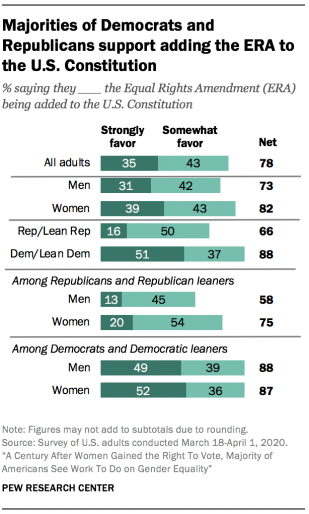
The survey finds widespread support for adding the ERA to the U.S. Constitution: About eight-in-ten Americans (78%) say they favor it, including 35% who strongly favor it being added to the Constitution. Women are more likely than men to say they strongly favor adding the ERA to the Constitution (39% vs. 31%), but about three-quarters or more in each group say they favor it at least somewhat.
Democrats overwhelmingly favor adding the ERA to the U.S. Constitution, with roughly nine-in-ten saying they favor it strongly (51%) or somewhat (37%). There’s less support among Republicans: 66% say they favor adopting the ERA, with 16% expressing strong support for this. Republican women (75%) are far more likely than Republican men (58%) to say they favor adding the ERA to the Constitution. Views on this do not differ by gender among Democrats, but they do vary across other dimensions, including educational attainment, race and ethnicity, and age.
Large majorities of Democrats across levels of educational attainment say they favor adding the ERA to the Constitution, but those with at least a bachelor’s degree are the most likely to express strong support: 62% say they strongly favor adopting the ERA, compared with 55% of Democrats with some college and a smaller share of those of those with a high school diploma or less education (37%).
Among white Democrats, 58% say they strongly favor adding the ERA to the U.S. Constitution. About four-in-ten Black and Hispanic Democrats say the same (42% each). These gaps remain when taking differences in educational attainment into account.
And while more than eight-in-ten Democrats across age groups support adopting the ERA, those ages 65 and older are more likely than those who are younger to express strong support. About six-in-ten Democrats ages 65 and older (63%) say they strongly favor adding the ERA to the Constitution, compared with 46% of Democrats ages 18 to 29 and ages 30 to 49 and 52% of those 50 to 64.
These differences by age, educational attainment and race and ethnicity are present among Democratic men and women. Among Republicans, the only notable demographic split on views of adopting the ERA is along gender lines.
Many say adding the ERA to the Constitution wouldn’t make much difference for women’s rights
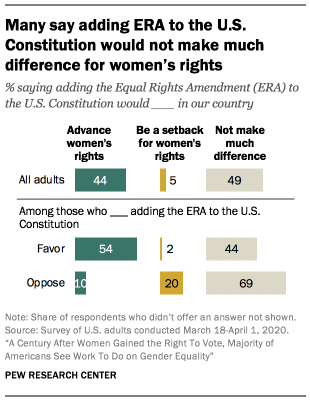
Despite widespread support for adding the ERA to the U.S. Constitution, 49% of Americans say this would not make much of a difference when it comes to women’s rights in the country; 44% say this would advance women’s rights and 5% think this would be a setback for women’s rights.
Even among those who favor adding the ERA to the Constitution, a sizable share (44%) is skeptical that this would have much of an impact, while 54% say it would advance women’s rights and just 2% see it as a potential setback. Democratic supporters of the ERA are far more likely than their Republican counterparts to say this would advance women’s rights in our country (63% vs. 38%). A majority of Republican ERA supporters (59%) say adding it to the Constitution wouldn’t make much difference.
Overall, male and female supporters of the ERA offer similar assessments of the impact adding the amendment to the Constitution would have on women’s rights; 54% of women and 53% of men who favor adopting the ERA say this would advance women’s rights in the U.S. Women ages 18 to 29 are more optimistic than women in older age groups to say adding the ERA to the Constitution would advance women’s rights. About six-in-ten women younger than 30 who support the ERA (63%) say adopting the amendment would advance women’s rights, compared with about half of older women who favor the ERA.
For the most part, adults who oppose adding the ERA to the U.S. Constitution say doing so wouldn’t make much difference for women’s rights (69% say this), while 20% think this would be a setback for women’s rights and 10% say it would advance women’s rights.




